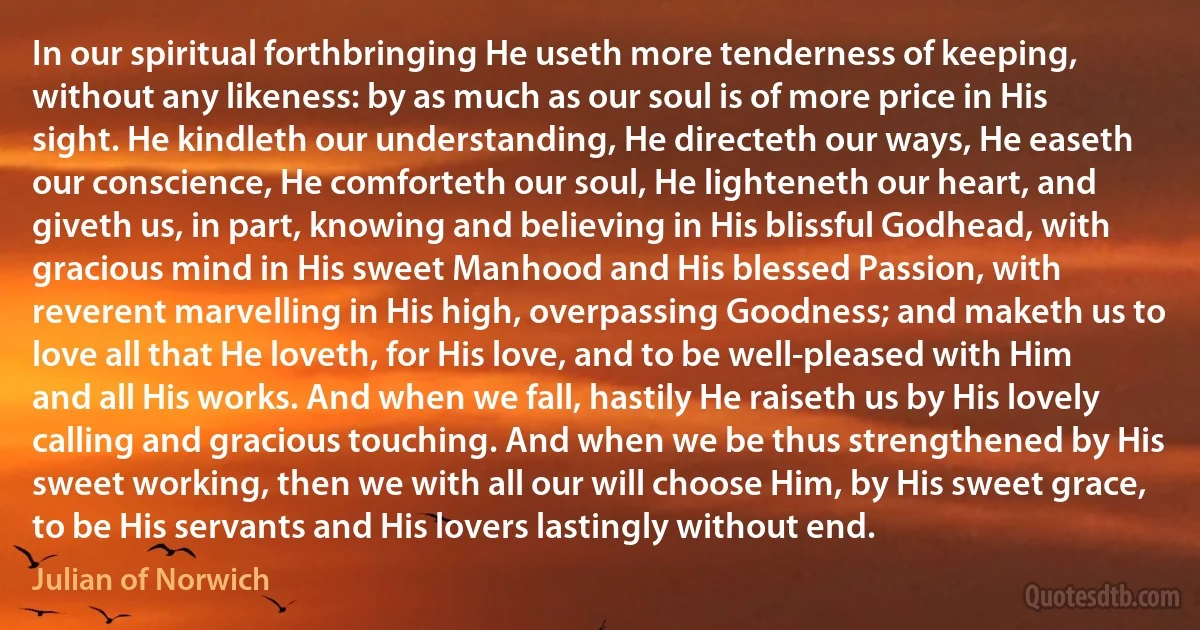
In our spiritual forthbringing He useth more tenderness of keeping, without any likeness: by as much as our soul is of more price in His sight. He kindleth our understanding, He directeth our ways, He easeth our conscience, He comforteth our soul, He lighteneth our heart, and giveth us, in part, knowing and believing in His blissful Godhead, with gracious mind in His sweet Manhood and His blessed Passion, with reverent marvelling in His high, overpassing Goodness; and maketh us to love all that He loveth, for His love, and to be well-pleased with Him and all His works. And when we fall, hastily He raiseth us by His lovely calling and gracious touching. And when we be thus strengthened by His sweet working, then we with all our will choose Him, by His sweet grace, to be His servants and His lovers lastingly without end.
Julian of NorwichRelated topics
calling choose conscience end fall godhead goodness grace heart high keeping knowing love lovely mind passion price sight soul sweet thus understanding working works waysRelated quotes
For what advantage is it, that the world enjoys profound peace, if thou art at war with thyself? This then is the peace we should keep. If we have it, nothing from without will be able to harm us. And to this end the public peace contributes no little: whence it is said, ‘That we may lead a quiet and peaceable life.' But if any one is disturbed when there is quiet, he is a miserable creature. Seest thou that He speaks of this peace which I call the third (inner, ed.) kind? Therefore when he has said, ‘that we may lead a quiet and peaceable life,' he does not stop there, but adds ‘in all godliness and honesty.' But we cannot live in godliness and honesty, unless that peace be established. For when curious reasonings disturb our faith, what peace is there? or when spirits of uncleanness, what peace is there?

John Chrysostom
WHAT HAPPENS AFTER DEATH?
When a human soul goes out of the body, some great mystery happens. For if it is guilty of sins, then there come hordes of demons, evil angels and dark forces, take that soul and drag it to their side.
No one should be surprised at that, because if a man surrendered and fell prey to them while still alive in this world, will not they have even greater control over him and enslave him when he departs from this world?
As for the other, the better part of people, something different happens to them. There are Angels around the holy servants of God in this life; the holy spirits surround them and protect them; and when their souls are separated from the body, the choir of Angels welcomes them into their fellowship, into a bright life, and thus leads them to the Lord.

Macarius of Egypt
His grace,
Sit nature, fortune, motion, time and place. ]] From whence with grace and goodness compassed round,
He ruleth, blesseth, keepeth all he wrought,
Above the air, the fire, the sea and ground,
Our sense, our wit, our reason and our thought,
Where persons three, with power and glory crowned,
Are all one God, who made all things of naught,
Under whose feet, subjected to his grace,
Sit nature, fortune, motion, time and place.This is the place, from whence like smoke and dust
Of this frail world the wealth, the pomp and power,
He tosseth, tumbleth, turneth as he lust,
And guides our life, our death, our end and hour:
No eye, however virtuous, pure and just,
Can view the brightness of that glorious bower,
On every side the blessed spirits be,
Equal in joys, though differing in degree.

Torquato Tasso
O brave youth, how good for thee it were couldst thou be made to understand how infinitely precious are thy school years-years when thou hast leisure to grow, when new worlds break in upon thee, and thou fashionest thy being in the light of the ideals of truth and goodness and beauty! If now thou dost not fit thyself to become free and whole, thou shalt, when the doors of this fair mother-house of the mind, close behind thee, be driven into ways that lead to bondage, be compelled to do that which cripples and dwarfs; for the work whereby men gain a livelihood involves mental and moral mutilation, unless it be done in the spirit of religion and culture. Ah! well for thee, canst thou learn while yet there is time that it will profit thee nothing to become the possessor of millions, if the price thou payest is thy manhood.

John Lancaster Spalding
Excellent Lord: -Knowing your Excellency's love for painting and your passion for protecting it as shown in the patronage of Ginlio Eomano; -being further desirous of pleasing your Excellency, -I have taken the opportunity of Messer Pietro Aretino's arrival [in Venice] to paint his likeness, and as he comes - a second St. Paul -to preach the virtues of your Excellency, and I likewise know that you are fond of so faithful a servant because of his many virtues, I make you herewith a present of his portrait. But I also bear in remembrance the Signor Girolamo Adorno who adored the Marquis of Mantua, and as he was a qualified gentleman, I send your Excellency a present of him also. These may not be gifts worthy of so great a person as your Excellency.... Most devoted servant, Titiano Vecellio.

Titian
